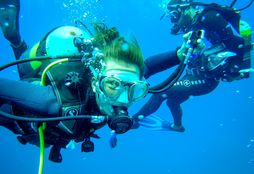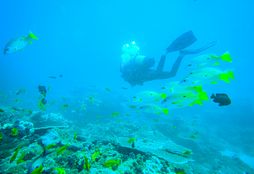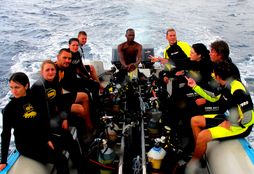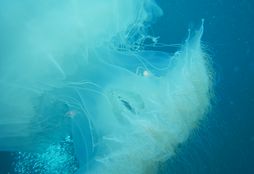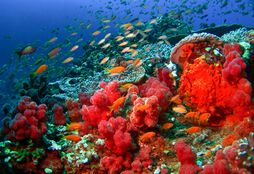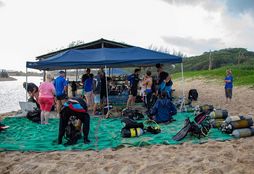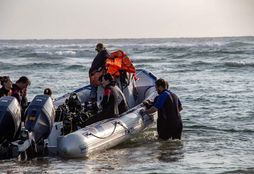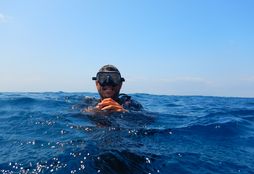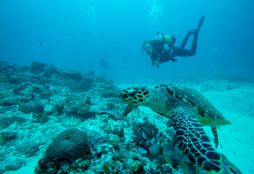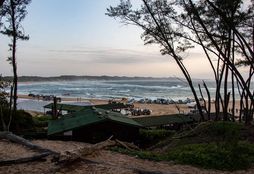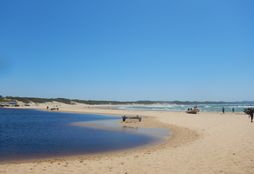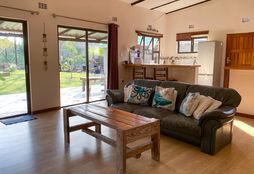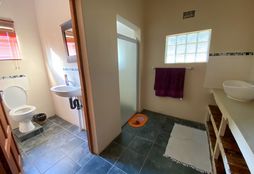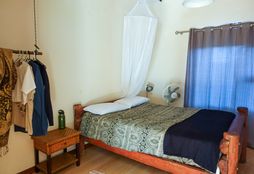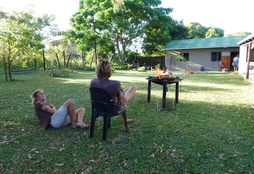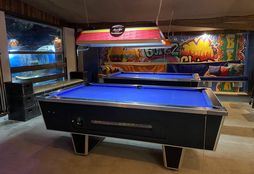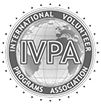Highlights
- Experience a diving vacation in South Africa while contributing to marine research efforts.
- Obtain a world-recognised dive qualification from PADI.
- Dive on one of the most amazing reef complexes in the world with 50 km of pristine reefs.
- Enjoy casual marine lectures to learn more about the ocean.
- Feel like a true Sodwana Bay local and immerse yourself in the small rustic town.
- Live a lifestyle different to your own, enjoy a laid-back beach life surrounded by nature.
Project information
The Scuba Diving Conservation Project offers the experience of a lifetime with a volunteering and diving vacation rolled into one!
This project accepts both qualified and non-qualified divers; we offer diving courses during the first week for non-divers and further diving qualifications for divers. Each day, five days of the week, volunteers drive on the back of a bakkie through the coastal forest to the beach for their morning dive. At the beach, we kit up under the gazebo and head out on the boat through the waves to dive on some of the best reefs in the world.
After the morning dive, volunteers can choose to stay on the beach or head back to camp to freshen up and eat lunch. We then enter the data collected from the dive into the database and relax and enjoy a casual lecture on the Sodwana marine life from a local Zoologist.
The rest of the day is up to the volunteers! With help of the on-site coordinators, plan out your perfect day. Whether it's relaxing by a nearby pool in town, learning to surf, going to a local viewpoint to watch the sunset or so much more.
The camp is ideally situated within walking distance of many shops, restaurants, bars and cafés. The camp is also next to a local favourite to hang out, play pool and enjoy the best burgers in town, so don't worry if you are travelling alone, you will get the chance to meet many new amazing people during your stay.
Please note that the project cannot take participants who have certain physical limitations (e.g. blindness, being wheelchair bound or severe motion sickness).
Your role
The first week is used to complete the PADI Open Water or Advanced Open Water course. If you are already a qualified diver, you will begin with research diving on the Monday after you arrive.
Volunteers dive every day during the week in the morning, collecting photographic data on mainly nudibranchs to research the biodiversity in Sodwana Bay and learn about nudibranchs as bioindicators for reef health and climate change.
Once database entries and lectures are done for the day, you may take the rest of the day off. There are loads of awesome activities to keep you busy during your stay.
Accommodation
The property has a main house with three twin rooms, a kitchen, a lounge and one shared bathroom.
There is a smaller two-bedroom house for busier times that has a small lounge, kitchenette, and a shared bathroom. All bathrooms have a shower, a toilet and basins. There is also a washing machine for the volunteers to use free of charge. Bedding is provided but towels need to be brought.
The accommodation has a big garden with a fire area to braai (BBQ) or have a bonfire. As it is located on the town's main road, volunteers have the freedom to walk to different restaurants, bars and shops. The bar and restaurant next door have pool tables, TVs and offers free Wi-Fi.
Meals
Each week, volunteers make a shopping list for the week as per the budget, which is included in the project cost. Staff will then purchase the groceries.
The weekly food budget covers the basic staple foods; extra luxuries can be bought by the volunteers at their own expense (e.g. chips, sweets, alcohol etc.). The volunteers then prepare their own meals in the communal kitchen.

